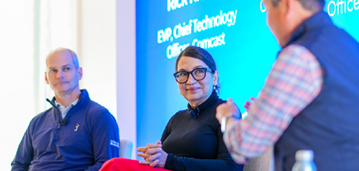Network Engineers Are Making It Rain

The most important people at a company often don't have a “C” at the beginning of their job titles. Think about a salesperson who always manages to pull in the biggest clients, or a marketer who has their finger on the pulse of what your customers want, or the product development manager who constantly develops innovative new features and services. They’re the rainmakers—the people whose talents, creativity and hard work create the new ideas and markets that power business growth.
The next wave of rainmakers is not likely to be celebrated for sealing million-dollar deals or glamorized in the executive-obsessed business press—but they’re going to be responsible for creating trillions of dollars in value for companies in the next 10 years. Who are these uncelebrated yet powerful people? Network engineers—the men and women responsible for connecting businesses to their employees, customers and partners, no matter where they are.
Already a crucial contributor to business success, network engineers are creating more value than ever before as the adoption of software-defined networking, cloud computing and the Internet of Things creates opportunities for companies in every industry. In today’s connected economy, the network is where business happens, and the best network engineers think creatively about how to build networks that enable collaboration between employees and connect those employees directly with their customers.
Some of the world’s most valuable and exciting companies, like Airbnb, Uber and Facebook, are built completely on networked technology. On average, it used to take Fortune 500 companies 20 years to reach a billion-dollar valuation; for digital startups today, it can take four years. The World Economic Forum (WEF) estimates that the combined value to society and industry of digital transformation across industries could be more than $100 trillion over the next 10 years. And network engineers will literally lay the groundwork to create this value.
Kevin O’Toole, Senior Vice President of Product Marketing at Comcast Business, says digital transformation means going beyond being connected and offering a simple digital experience to customers to fundamentally changing how a company operates and how it interacts with customers.
“If you look at digital transformation through the lens of the general business, it’s about the opportunity to take massive friction out of your business, because the software has become so nimble and the networks have become so fast,” O’Toole says.
The drastic reduction in the cost of technologies is also accelerating this change; a top-of-the-line drone cost $100,000 in 2007, while today a drone built to those same specifications costs just $500, according to WEF. That means that all businesses, regardless of size, can benefit from connected technologies. Digital transformation is more than an opportunity, it’s a necessity, because competitors are going to be making similar moves.
“You don’t have a choice,” O’Toole says. “You have to do it.”
The hottest trend in enterprise networking is SD-WAN (software-defined wide-area network) technology, which is used to connect enterprise networks over large geographical areas (for example, connecting headquarters with branches across the country, and connecting those branches with each other). SD-WAN allows companies to replace the expensive and cumbersome legacy systems used to connect branches with smarter, more flexible software-defined connections that help companies tap into more capable and cost-effective high-speed broadband, according to O’Toole.
“The promise of SD-WAN is that instead of having many devices at your business, each of which is complicated and vulnerable to security problems, you have a single device running different software packages that are more reliable and easier to manage,” O’Toole says.
According to Bloomberg Intelligence, the SD-WAN equipment market is growing as end users increasingly adopt it to manage their networks from a centralized dashboard. SD-WAN technology is ideally suited for managing data and apps stored in the cloud.
Network engineers can use technologies like SD-WAN to create business opportunities. In advertising, smart networks power digital media boards to make ads more dynamic and effective. Network engineers also can help smaller businesses compete against the biggest industry players, because those small businesses can now access every function they need from the cloud, from customer relationship management to secure point-of-sale systems. And as the customer experience becomes more essential to retailers, robust Wi-Fi networks built by network engineers are essential to create personalized shopping experiences for customers and keep those customers in the store.
Noam Rafaelli, Senior Vice President of Network and Communications Engineering at Comcast Business, says the most exciting element of SD-WAN is decoupling the software from the hardware. Network engineers aren’t just building the network, they’re developing the software that runs the network, to help businesses operate faster and smarter.
“It’s a huge transformation, and SD-WAN is one of the main capabilities that enables it,” Rafaelli says.
This transformation has put the network engineer in the driver’s seat. The whole reason for building networks is to enable the applications that make businesses successful, O’Toole says. Today, those applications that connect employees and customers depend on the bandwidth and connectivity across locations that the network provides. Because the network engineer is building the network and developing the software that runs it, the engineer now has as much if not more knowledge than the traditional rainmakers who develop and sell new products and services.
“All of a sudden, the network engineers really have better insight into what’s possible, because they’re the ones closer to how the technology is changing,” O’Toole says.
The best network engineers help a company understand what’s possible, then put the infrastructure in place to make it real. In other words, they provide the simplicity and the pragmatism to create business solutions, according to Rafaelli.
“The network engineer that’s doing their job right is bringing solutions to the table that take advantage of today’s disruptive technology,” O’Toole says. “Instead of saying, ‘Gee, I need to be able to keep doing the same thing,’ they’re coming to the table and saying, ‘Hey, I’ve found a way to get 10 times as much bandwidth for half the cost, and I’ve found a way to take out a bunch of overhead and management complexity by moving to a next-generation SD-WAN. And that allows you to reinvest that money in these applications you need and, by the way, make some of these applications possible.’”
The future increasingly looks like it’s going to belong to network engineers, and to the forward-thinking business leaders who work with them to capture the value created by digital transformation and make it rain for their businesses and customers.
“I can’t imagine a better time to be a network engineer than right now,” O’Toole says. “Because it’s all changing again, and when it’s all changing, you have a great opportunity to have a big impact. The flip side is, you better pay attention.”
This article originally appeared on Bloomberg.
The future of business success belongs to network engineers and forward-thinking business leaders for the value created by digital transformation.
Locked Content
Click on the button below to get access
Unlock NowOr sign in to access all content on Comcast Business Community
Resource Center
Learn how Comcast Business can help
keep you ready for what's next.











